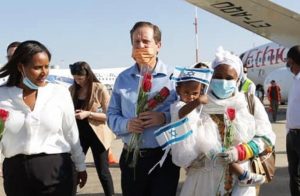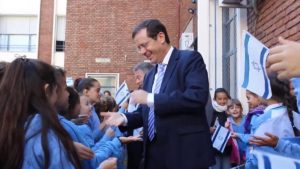Itongadol.- The president of the Jewish Agency for Israel, Isaac Herzog, dialogued in an exclusive interview with Iton Gadol about the current situation of Jewish communities around the world in light of the challenges they must face to survive the coronavirus crisis. «As many communities are facing very difficult times, it’s especially important to me that there is a connection with Israel and that we extend support to our sisters and brothers around the world», he said.
A few weeks ago, the Jewish Agency organized together with the Ministry of Diaspora Affairs in Israel a forum of world community leaders «to better understand how we can help Jewish communities recover from the COVID crisis». Herzog said that this is «the first cooperation of its sort, with the participation of the Government of Israel and global and regional social welfare organizations» in order to «assess the devastating implications COVID-19 has had on Jewish communities worldwide and the necessary steps to address their most pressing needs».

As part of this cooperation, at the end of April the Jewish Agency announced the creation, in partner with Keren Hayesod and the Jewish Federations of North America (JFNA), of the «COVID-19 Loan Fund for Communities in Crisis», a $10 million fund that will provide no-interest loans to organizations that provide essential services to ensure the survival of Jewish communities that are at risk from the pandemic. «We created this fund in response to urgent calls from communities and organizations in countries such as Italy, Spain, South Africa, South American communities, and others to provide immediate cash flow», explained Herzog.
Here are the details of the interview by Iton Gadol to Isaac Herzog:
Iton Gadol- How are you personally living this moment that the world is going through?
IH- Ever since I became Chairman of The Jewish Agency, I’ve had the honor of visiting Jewish communities around the world. Being on the ground allows me to better understand each community and the challenges they face – it also gives way to the discussion on how The Jewish Agency can help strengthen these communities and their connection to Israel. So while I can’t currently visit our Jewish communities, I remain in as close contact as possible. As many communities are facing very difficult times, it’s especially important to me that there is a connection with Israel and that we extend support to our sisters and brothers around the world.
IG- How did the Jewish Agency become aware of the danger of the pandemic in the Jewish communities?
IH- The Jewish Agency has an extensive global network and we are in ongoing contact with the Jewish communities around the world. In many places, we still have shlichim on the ground who serve as a vital connection point. We are working to help the communities most impacted by the pandemic and continue to monitor developments around the world.

Herzog in his visit to Argentina in March, 2019 where he visited schools of the Jewish community.
IG- A few weeks ago the Jewish Agency for Israel and the Ministry of Diaspora Affairs of Israel had an important meeting to evaluate the impact of COVID-19 and to organize the help to the Jewish communities of the world, can you detail some of the actions and decisions you have taken? And who participated there?
IH- The Jewish Agency, together with the Ministry of Diaspora Affairs, initiated a global roundtable to better understand how we can help Jewish communities recover from the COVID crisis. This is the first cooperation of its sort, with the participation of the Government of Israel and global and regional social welfare organizations.
The first call included over 30 leaders from major global and regional Jewish organizations around the world to assess the devastating implications COVID-19 has had on Jewish communities worldwide and the necessary steps to address their most pressing needs. The participating organizations were committed to gathering all knowledge, experience and leadership needed for strengthening communities’ resilience, as well as for the restoration of global Jewish life.
The five-issue areas covered on the call included: community – the need for rehabilitation and assistance in surviving the crisis; resources – effectively collecting and distributing aid; hope and morale – promoting unity and mutual responsibility; education – current and future needs; antisemitism – preparation for future outbreaks. These pressing matters will continue to be addressed in upcoming forum meetings and in subcommittees on each topic.
4- What is your diagnosis on the situation of the Jewish communities in the Diaspora?
The COVID-19 crisis has impacted communal life throughout the Jewish world, bringing significant economic distress to many communities – including those that were previously financially stable. Many communities are now challenged to finance basic communal services. Educational activities have been discontinued, and essential welfare services are in danger of being closed. Jewish life is based on communal gatherings – at the synagogue, the community center, holidays. All this has stopped now. As I said above, there are many communities that have been especially hard hit by the virus and need our help to make it through these trying times.
Our main effort to support communities is the COVID-19 Loan Fund for Communities in Crisis which we launched together with our partners Keren Hayesod and Jewish Federations of North America (JFNA). We created this fund in response to urgent calls from communities and organizations in countries such as Italy, Spain, South Africa, South American communities, and others to provide immediate cash flow. This fund will provide no-interest loans to organizations providing services essential to the continuing existence of Jewish communities which are now at-risk to survive the COVID-19 crisis.
5 – What is your message to the Jewish leadership?
There has never been so much unity among our people, among all Jewish denominations and among all Jewish leadership. Right now, the goal for Jewish leadership is to join together and see how we find solutions for each and every community that has been impacted. This is the time to unite and do all we can to ensure the survival of our communities, to stand by our sisters and brothers and help them bridge this very difficult period.
6- What is your message to the people of the kehilot?
We are indeed one Am Israel. It’s so strongly evident these days – that we really feel a responsibility for one another. Every day, I hear from different people from different parts of the world saying how concerned they are about other Jewish communities. The State of Israel is concerned and wants to help. This is what it means to be Am Israel. To be there for each other in the hard times, to do whatever we can to ease each other’s suffering and to keep us connected to one another and to the State of Israel.


